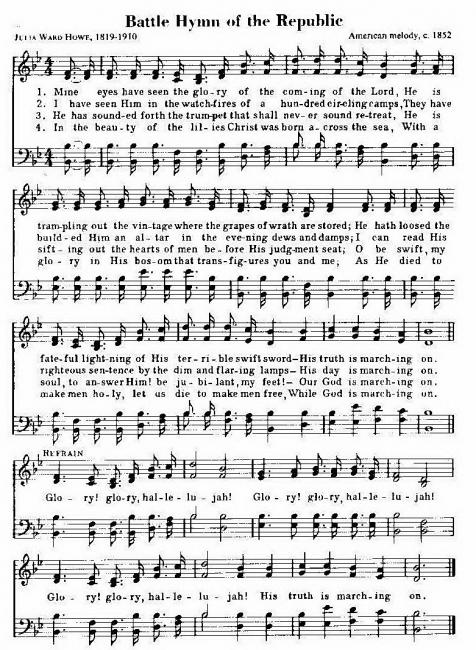Traditional Christian Hymns
"Battle Hymn of the Republic"
BATTLE HYMN OF THE REPUBLIC
Author: Julia Ward Howe, 1819-1910
Music: American melody, c. 1852
“Some trust in chariots, and some in horses: but we will remember the name of the Lord our God.” Psalm 20:7
Music always had a unique way of stirring strong feelings of patriotism. Of our several fine national hymns, this particular hymn has been unrivaled for inspiring these noble responses.
The words for this hymn first appeared in the February, 1862, issue of The Atlantic Monthly magazine and were published as the Civil War battle song of the Republic. The author, Julia Ward Howe, received the grand total of five dollars for her literary efforts. Mrs. Howe and her doctor husband had recently moved from Boston to Washington, D.C., where he was involved in medical service for the government. Julia became deeply anguished as she noted the growing angry mood of the nation and its frenzied preparations for the tragic war between the northern and southern states. Day after day Mrs. Howe watched the troops go by as they marched off to war and heard them singing the strains of "John Brown's Body" - named for a self-styled abolitionist who was hanged for his efforts to have the slaves freed.
One day, while witnessing a parade of soldiers singing this catchy tune, a visiting friend and her former pastor, the Rev. James Freeman Clarke of Boston, turned to Mrs. Howe and said, "Why don't you write some decent words for that tune?" "I will," answered Mrs. Howe, and the words came to her that same evening. She has left the following account:
“I awoke in the gray of the morning, and as I lay waiting for dawn, the long lines of the desired poem began to entwine themselves in my mind, and I said to myself, "I must get up and write these verses, lest I fall asleep and forget them!" So I sprang out of bed and in the dimness found an old stump of a pen, which I remembered using the day before. I scrawled the verses almost without looking at the paper.”
Soon the entire nation was united in singing, "Mine eyes have seen the glory of the coming of the Lord..."rather than the many derisive phrases coined about "John Brown's Body." Julia Ward Howe's text, written in response to a challenge to make better words for an existing Southern American camp meeting tune, was destined for immortality.
Julia Ward Howe was born on May 27, 1819, in New York City, into a wealthy family that had a distinguished lineage on both sides. Her ancestors were famous leaders in Revolutionary history. She was raised in a conservative, Episcopalian home, with a father who was an ardent Calvinist in his beliefs. Julia rebelled against these doctrines, however, and increasingly became very liberal in her religious convictions. In 1848 she married the well-known humanitarian, Dr. Samuel Gridley Howe, who was twenty years her senior. In his younger days he had fought in the Greek War of independence and had written the book, Historical Sketches of the Greek Revolution. Later he served as the director of the Perkins Institute for the Blind in Boston, Massachusetts. After marriage Mrs. Howe became even more involved in her humanitarian pursuits. She was especially vehement in her opposition to slavery. She joined the Radical Club, studied modem philosophies and became a member of the Unitarian Church, often filling the pulpits for these churches. She stated her religious convictions vigorously, "Nothing of what I have heard or read has shaken my faith in the leadership of Christ in a religion which makes each man the brother of all, and God the beneficent Father of each and all." Even as a liberal thinker, however, she always maintained her belief in the presence of a personal God and His over-ruling power and truth in controlling the affairs of mankind. In addition to her role as a leader in the Woman's Suffrage Movement in this country, she organized in 1870 an international crusade for all women of the world to unite for the purpose of ending war for all time. In 1910, just twelve days before her death, she was awarded an honorary Doctor of Laws Degree from Smith College for her life-long accomplishments.
Although this Civil War hymn gave Mrs. Howe her first national acclaim, she was also known for other publications, including three volumes of poetry-Passion Flowers, 1854; Words of the Hour, 1856; and Later Lyrics, 1866. This remarkable woman was also the mother of four children, all of whom became eminently successful in fields of science and literature. Mrs. Howe continued her active life in causes of human betterment until her death in Newport, Rhode Island, on October 17, 1910, at the age of ninety-one.
It is recorded that this hymn was sung at a large patriotic rally attended by President Lincoln. After the singer had finished, the audience responded with tumultuous applause. The President, with tears in his eyes, cried out, "Sing it again," and it was sung again. It soon became accepted as one of our finest national hymns, finding its way into almost every American hymnal. Its original purpose of serving as a battle song for the Northern Republic during the Civil War was soon forgotten.

Taken from 101 Hymn Stories © Copyright 1982 by Kenneth W. Osbeck. Published by Kregel Publications, Grand Rapids, MI. Used by permission of the publisher. All rights reserved.
Return To Traditional Christian Hymns
Return to Praise and Worship Home Page
Enjoy this page? Please pay it forward. Here's how...
Would you prefer to share this page with others by linking to it?
- Click on the HTML link code below.
- Copy and paste it, adding a note of your own, into your blog, a Web page, forums, a blog comment,
your Facebook account, or anywhere that someone would find this page valuable.